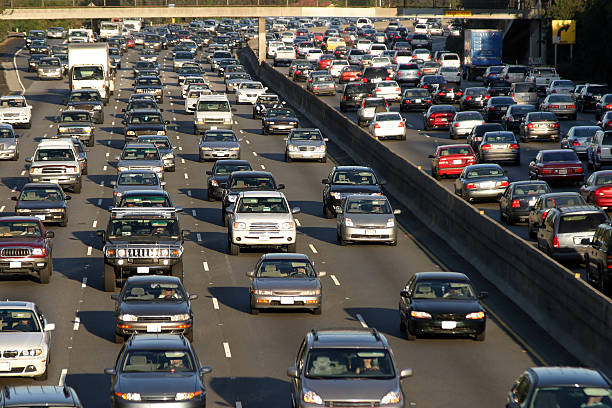California is Banning Sale of Gas Cars by 2035
Traffic jam in Los Angeles
On Thursday August, 25, 2022, California Air regulators voted against banning the sales of new gas cars to move forward to electric and more environmentally friendly vehicles. With the ban of gas cars, it would call for no longer using them anymore and phasing them out, Golden Valley AP Economy teacher weighs in on the implications of this new law and different impacts this will do to society’s individuals.
This is something that is quite historical in the state of California, considering having a multitude of urban and high-populated cities, with much modernization. Many people drive their own vehicles that are gas-powered for the majority of society, since electric cars are more on the pricey side for many.
These ideas and plans regarding the ban of gas-powered cars have been circulating for a couple of years now, but until recently, these ideas have actually taken action to pursue and change the world and lifestyles.
The California Air Resource Board’s new rules include of quotas for the zero-emissions vehicles to be as follows: by 2026, 35% of new vehicles, SUVs and small pick-up trucks sold, will have to be zero-emission, and the percentage would increase each year, expecting 51% of new car sells in 2028, 68% in 2030, and finally 100% in 2035. Many wonder what will happen to hybrid vehicles, and the sale of them; the quotas allow for 20% of the zero-emissions vehicles to be hybrids.
This created much wonder about the ability to drive vehicles that people have owned for years that are gas-powered, since the idea of zero emissions vehicles is still very new to many individuals. This new ban will not get rid of and ban all gas-powered vehicles off the road immediately; there will be a grace period, and will not come to an end until 2026, said Daniel Speriling, a member of the CARB.
CARB is taking the opportunity to work with the Biden Administration to reduce the emission of greenhouse gasses. When interviewing Golden Valley’s Economics, and AP Economics teacher, Joshua Stimac, he mentioned that we will have to wait and see if the state of California’s decisions get passed by the federal government and the fact that “the Biden Administration can approve California’s efforts, but then a future administration can say ‘No, you cannot go beyond federal guidelines for this’”.
Stimac, like many economists, believe it is better if this change were to occur naturally rather than forced, as it would cause a lot of externalities– or unintended consequences– of a decision. If there is an enforcement of electric cars having to be bought, it would negatively affect the middle-class, and especially the poor.
Before panicking and stressing about this news, one thing that all people have to take into consideration is the time span. We still have to wait on the approval of the federal government, and the 13 years in between as well, since 2035 is still quite far from now. We are a part of a generation that has experienced a global pandemic and have had to go in lock-down and quarantine. We had to change our lifestyle, from working miles away to working from home, and waking up 2 minutes before class to attend school online. A lot can happen in 13 years and it is best to be prepared if this does get approved and put into action, however there are too many factors to take into consideration before fully knowing if this plan will successfully go through.

Ayleen Terrones Martinez is a Managing Editor for the relaunched Journalism course at Golden Valley High School, born and raised in Southern California. She is a senior, in her last year of high school, and is involved in the Vocal Arts program, Theater, and Lighthouse Club. She enjoys playing Tennis with her younger sister when she can, as well as reading, and listening to music, and trying to be updated on events around her. She wants to give performing arts more spotlight in her articles whenever she can.
Being a journalist is something new to her, but exciting since this is something out of the ordinary for her English class and is looking forward to learning the basics of journalism and developing her skills in journaling, and being able to be the foundation for this new course that will hopefully run in future years.



















